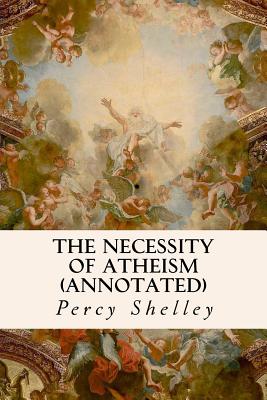The Necessity of Atheism (annotated)

The Necessity of Atheism (annotated)
The Necessity of Atheism is a classic religious essay by the great English poet, Percy Shelley. A close examination of the validity of the proofs adduced to support any proposition is the only secure way of attaining truth, on the advantages of which it is unnecessary to descant: our knowledge of the existence, of a Deity is a subject of such importance that it cannot be too minutely investigated; in consequence of this conviction we proceed briefly and impartially to examine the proofs which have been adduced. It is necessary first to consider the nature of belief. The tract starts with the following rationale of the author's goals: "As a love of truth is the only motive which actuates the Author of this little tract, he earnestly entreats that those of his readers who may discover any deficiency in his reasoning, or may be in possession of proofs which his mind could never obtain, would offer them, together with their objections to the Public, as briefly, as methodically, as plainly as he has taken the liberty of doing." Percy Bysshe Shelley, The Necessity of Atheism Shelley made a number of claims in Necessity, including that one's beliefs are involuntary, and, therefore, that atheists do not choose to be so and should not be persecuted. Towards the end of the pamphlet he writes: "the mind cannot believe in the existence of a God." Shelley signed the pamphlet, Thro' deficiency of proof, AN ATHEIST, which gives an idea of the empiricist nature of Shelley's beliefs. According to Berman, Shelley also believed himself to have "refuted all the possible types of arguments for God's existence," but Shelley himself encouraged readers to offer proofs if they possess them. Opinion is divided upon the characterisation of Shelley's beliefs, at the time of the writing of Necessity. At the very beginning of his note on the line "There is no God" in Canto VII of Queen Mab, published just two years later and based on Necessity, Shelley qualifies his definition of atheism: "There Is No God. This negation must be understood solely to affect a creative Deity. The hypothesis of a pervading Spirit co-eternal with the universe remains unshaken." Percy Bysshe Shelley, Queen Mab, Canto VII, Note 13 Shelley also quotes the Dutch pantheist Benedict Spinoza later in the Note, but there is no explicit statement of pantheistic views. Shelley scholar Carlos Baker states that "the title of his college pamphlet should have been The Necessity of Agnosticism rather than The Necessit
PRP: 46.42 Lei
Acesta este Pretul Recomandat de Producator. Pretul de vanzare al produsului este afisat mai jos.
41.78Lei
41.78Lei
46.42 LeiLivrare in 2-4 saptamani
Descrierea produsului
The Necessity of Atheism is a classic religious essay by the great English poet, Percy Shelley. A close examination of the validity of the proofs adduced to support any proposition is the only secure way of attaining truth, on the advantages of which it is unnecessary to descant: our knowledge of the existence, of a Deity is a subject of such importance that it cannot be too minutely investigated; in consequence of this conviction we proceed briefly and impartially to examine the proofs which have been adduced. It is necessary first to consider the nature of belief. The tract starts with the following rationale of the author's goals: "As a love of truth is the only motive which actuates the Author of this little tract, he earnestly entreats that those of his readers who may discover any deficiency in his reasoning, or may be in possession of proofs which his mind could never obtain, would offer them, together with their objections to the Public, as briefly, as methodically, as plainly as he has taken the liberty of doing." Percy Bysshe Shelley, The Necessity of Atheism Shelley made a number of claims in Necessity, including that one's beliefs are involuntary, and, therefore, that atheists do not choose to be so and should not be persecuted. Towards the end of the pamphlet he writes: "the mind cannot believe in the existence of a God." Shelley signed the pamphlet, Thro' deficiency of proof, AN ATHEIST, which gives an idea of the empiricist nature of Shelley's beliefs. According to Berman, Shelley also believed himself to have "refuted all the possible types of arguments for God's existence," but Shelley himself encouraged readers to offer proofs if they possess them. Opinion is divided upon the characterisation of Shelley's beliefs, at the time of the writing of Necessity. At the very beginning of his note on the line "There is no God" in Canto VII of Queen Mab, published just two years later and based on Necessity, Shelley qualifies his definition of atheism: "There Is No God. This negation must be understood solely to affect a creative Deity. The hypothesis of a pervading Spirit co-eternal with the universe remains unshaken." Percy Bysshe Shelley, Queen Mab, Canto VII, Note 13 Shelley also quotes the Dutch pantheist Benedict Spinoza later in the Note, but there is no explicit statement of pantheistic views. Shelley scholar Carlos Baker states that "the title of his college pamphlet should have been The Necessity of Agnosticism rather than The Necessit
Detaliile produsului








